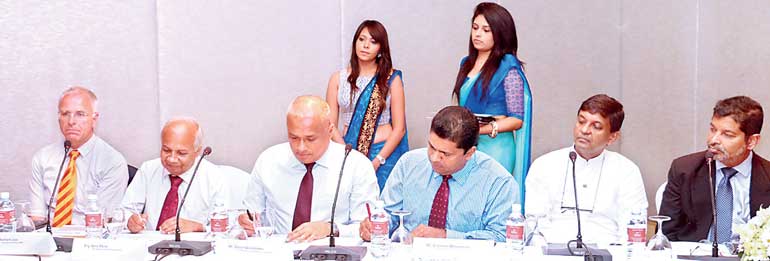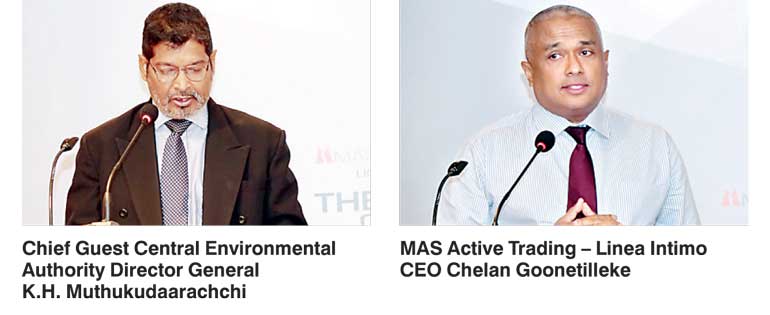Tuesday Feb 24, 2026
Tuesday Feb 24, 2026
Monday, 27 July 2015 00:00 - - {{hitsCtrl.values.hits}}
MAS breaks new ground with the world’s first chemical leasing project for waste water treatment; UNIDO applauds it as a great start for Sri Lanka and a giant leap in rethinking chemical management by responsible business brands

As part of a long-term commitment to environmental sustainability, MAS unveiled its latest sustainability innovation with the signing of the world’s first chemical leasing agreement on waste water treatment.
This milestone is one of several stories to spring out of the growing pipeline of sustainability projects currently underway at MAS. It is also part of an internal goal by the apparel giant to make its products free of toxic chemicals by 2020.
MAS Active Linea Intimo executed the project in partnership with Watercare Technologies Ltd., UNIDO and the National Cleaner Production Centre (NCPC) of Sri Lanka. The move to rethink chemical management within Linea Intimo is simply a beginning, says the CEO of Linea Intimo Chelan Goonetilleke.
“MAS has always been raising the bar in environmental sustainability. And this is a project that just marks the start of more great innovations from our sustainability teams. We will stay humble and we don’t like talking about what we do but there is always something going on behind the scenes and our sustainability journey continues from when it began 10 years ago.”
At an internal event to share lessons learnt, MAS Active Linea Intimo was joined by several global and national authorities on chemical leasing including UNIDO, the Central Environmental Authority and the National Cleaner Production Center of Sri Lanka.
Focus on the future
Sharing his views on the concept of Chemical Leasing, Prof. Ajith De Alwis, the Project Director of the Coordinating Secretariat for Science Technology and Innovation, applauded MAS for creating a brand new business model innovation by applying the concept to waste water treatment.

“You need innovation and what you are doing today is an interesting business model innovation. You have to innovate across the board and how innovative you are as an organisation differentiates you on the world stage. When you are a leading organisation in innovation you are not compromising the future for the sake of the market, in that context you have to make a bolder decision.”
Linea Intimo learnings
The new chemical management business model will see the complete revamping of the existing waste water management system implemented at Linea Intimo – moving it forward into an even more environmentally responsible, proactive era of waste water treatment and management.
The results of the program have been ground-breaking. Linea Intimo achieved 20-30% of overall chemical savings while substituting one chemical with one with a lower environmental impact. The only hazardous chemical used in the process was reduced by more than 50%.
As part of the tri-party agreement Linea Intimo will compensate Watercare for each cubic meter of waste water treated and the entire system will be monitored and calculated by the NCPC independently – ensuring that the project continues smoothly and adheres to all chemical leasing principles. Nadeera Wijesinghe, Assistant Manager for Sustainability at MAS Active Linea Intimo, explained how the project turned out to be a world’s first. “When our first trial failed and we looked for some literature to learn more, we discovered there was none. Nobody had followed this through to a successful business model. There were failed cases and they did not have much details. The closest project to ours was the Colombian project which was more focused on oil. So we decided to give it up. But after a few months we said ‘let’s try again’ with the full strength of our teams and training of our staff to a modified treatment system. We began trials in 2014 December and by end of March 2015 the trials proved successful and we were ready to go into a business model.
“You may think this is an optimisation project or an efficiency improvement project. The most important factor of this project is not the amount of chemical saved but the concept itself and the paradigm shift of thinking. We have redefined how chemical management can be done in a business environment. This has enabled us to reduce the environmental impact of the chemical usage while providing increased profits to both parties which seemed impossible under a traditional model of thinking.”
A tough act to follow?
Dr. Reinhard Joas, International Consultant to UNIDO (United Nations Industrial Development Organization), explained what this means for business in general “I think this is very promising and the world will look on it. Because this is the UNIDO concept, where we help with a lighthouse project. We cannot go to hundreds of companies and convince them. We can only go to a few and convince a few and then help them. And then others need to follow. The industry needs to follow.”
The project was also applauded by the Director General of the Central Environmental Authority K.H. Muthukudaarachchi, who described the MAS group as an organisation which goes beyond compliance with every environmental standard set by regulators. “We know that all businesses under MAS not just comply with the standard but go beyond compliance to achieve very high standards in environmental governance. Unfortunately not all industries have such a philosophy or the capacity. MAS Active Linea Intimo is already complying with the national requirements for discharge of chemicals and there was no need for them to try out a new business model. Their decision to test the new model is again going beyond compliance and is also leading by example and it will be motivation for other industries to apply the chemical leasing model to their operation.”